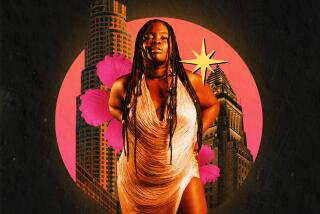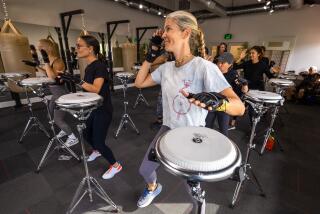Dance : Kwanzaa Celebration at Highways
- Share via
Besides offering celebration dances of the Djola, Malinke and Bambara peoples (among others), the Saturday program at Highways by Djimbe West African Drummers and Dancers arguably represented a coming-of-age ceremony for this Van Nuys-based group.
Instead of another audience-courting energy circus like the one Djimbe staged at “Dance Kaleidoscope ‘91,” the Highways “Black December” Kwanzaa event revealed enormous self-sufficiency and pride--along with the powerful drumming skills that have distinguished Djimbe from the beginning.
Interacting with leader Leon Mobley, drummers LeRoy Diggs, Eugene Blunt and Trevor Turpin created a rhythmic force field that allowed plenty of room for artful percussive textures, vibrant singing and even some distinctly American rap.
Since Kwanzaa belongs to contemporary African-American culture, the use of rap proved apt and potent, whether directed toward “the healing of the nation” in Mobley’s solo or “proving that we have a culture from the past to the present to the future” in the words of rapper-dancer Kashanti.
Of course, more traditional affirmations of heritage dominated the program. But even here, a sense of immediacy and community deepened the experience, as when Mobley and Malang Bayo took the vocal call-and-response of “Lengjeno” right into the first row of seats.
Bayo can move with incredible speed, but this fluidly staged piece emphasized his singing--often encircling him with company women--until he joined gymnast extraordinaire Carlos Spivey in a flamboyant stamping duet.
Bayo’s most unorthodox showcase came in the “Koumpo” finale where he appeared covered in straw with a long wooden pole rising from the top of his head. Although he looked like a giant broom, his ability to make the straw flow into spectacular splashes, eddies and cataracts established him as a god of the harvest, the magical embodiment of Kwanzaa itself.
If men provided the choreographic exclamation points on the Djimbe program--with Oscar Camara’s aerial circle-kicks representing one more example of the individualized virtuosity on view--the women supplied the context through both their relatively brief solos and all the demanding ensembles.
Indeed, while the drummers contributed the invigorating pulse of the evening, much of its joyful splendor wouldn’t have existed without Owanda Johnson, Gail A. Mobley, Phylise Smith, Ebrun Fayeh Crowder, Janiece Blunt and Yoseh Martin.
More to Read
The biggest entertainment stories
Get our big stories about Hollywood, film, television, music, arts, culture and more right in your inbox as soon as they publish.
You may occasionally receive promotional content from the Los Angeles Times.










